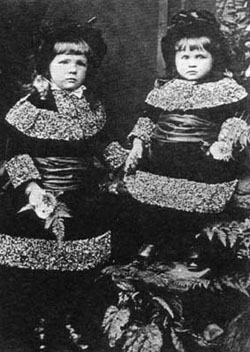|
|
|
|
|
|
|
|
![]()
 |
Daughters of Charles Dickens
1838-1896, 1839-1929
"Christmas was always a time," wrote Mamie Dickens, "which in our home was looked forward to with eagerness and delight, and to my father it was a time dearer than any other part of the year, I think. He loved Christmas for its deep significance as well as for its joys, and this he demonstrates in every allusion in his his writings to the great festival, a day which he considered should be fragrant with the love that we should bear one to another, and with the love and reverence of his Saviour and Master. Even in his most merry conceits of Christmas, there are always subtle and tender touches which will bring tears to the eyes, and make even the thoughtless have some special veneration for this most blessed anniversary.
"In our childish days my father used to take us, every twenty-fourth day of December, to a toy shop in Holborn, where we were allowed to select our Christmas presents, and also any that we wished to give to our little companions. Although I believe we were often an hour or more in the shop before our several tastes were satisfied, he never showed the least impatience, was always interested, and as desirous as we, that we should choose exactly what we liked best. As we grew older, present giving was confined to our several birthdays, and this annual visit to the Holborn toy shop ceased" (from My Father As I Recall Him by Mamie Dickens)
About her father, Katey's feelings were ambiguous and confused, a mingling of antagonism and irresistable fascination. Though she fought him, she feared and loved him at the same time, as if he were both the ogre and the Prince Charming of a fairy tale. He stormed her heart with tenderness and overwhelmed it with awe. "What could you expect from such an uncanny genius?"she exclaimed. The life of Dickens that she began writing, she burned: "I told only half the truth about my father, and a half-truth is worse than a lie...I knew things about my father's character that no one else ever knew; he was not a good man, but he was not a fast man...he was wonderful." (from Edgar Johnson, Charles Dickens: His Tragedy and Triumph)